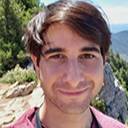CONTACT
Department of Chemistry
Todd Wehr Chemistry, 101
1414 W Clybourn St
PO Box 1881
Milwaukee, WI 53233
(414) 288-3515
Problem with this webpage?
Report an accessibility problem
Any other problem, contact muchem@marquette.edu.
 Dr. Ofer KedemMarquette UniversityMilwaukeeWI53201United States of AmericaDr. Kedem is no longer accepting graduate students into his group.The Kedem Lab
Dr. Ofer KedemMarquette UniversityMilwaukeeWI53201United States of AmericaDr. Kedem is no longer accepting graduate students into his group.The Kedem LabPh.D., Weizmann Institute of Science
M.Sc., Weizmann Institute of Science
B.Sc., Tel-Aviv University
We develop and study new nanomaterials for catalysis, signaling, and active matter. We are interested both in understanding how nanomaterials function, and in developing new and better ones. We also seek new ways to fabricate nanostructures, and novel ways to perform reactions.
Our ultimate goal is to introduce autonomous capabilities to nanomaterials, to make them responsive to local conditions, so they can operate independently. In this, we seek to make synthetic materials act more like living beings. To achieve this goal, we build hybrid inorganic-organic structures, such as metal nanoparticles coated with organic molecules, and study how the organic coatings affect the nanoparticles’ catalytic activity. Then, making the organic coatings responsive will make the entire assembly responsive.
We combine knowledge and techniques from all sub-fields of chemistry with inspiration from biological systems, and take a physical chemistry approach to analyzing the complex behaviors of dynamic, nanoscale systems. We currently focus on experimental work, but intend to introduce simulation studies in the future.
We currently focus on the following directions:
1. Nanoscale reaction control – metal nanoparticles (NPs) are excellent catalysts, but can we control their activity? What role do the nanoparticles’ stabilizing ligands play? What about their microenvironment? Can we engineer the surroundings of the particle to tune its activity, and even better, its selectivity? We seek to answer these questions, for both static and responsive structures.
2. Surface patterning – biological complexity arise from the interaction of multiple components, which react with one another, modulate one another, process and transmit information, and react to various signals. Crucially, components are present in spatially-distinct locations. To mimic such complexity in synthetic systems, we are developing highly-capable techniques for surface patterning.
3. Non-equilibrium transport – accurate nanoscale control requires transporting nanobots and cargo. Biological systems use asymmetric structures and potentials to produce transport, using a ratchet mechanism. Synthetic ratchets can transport particles ranging from micron-scale beads to individual electrons, and are a fascinatingly rich and complex field of study. We develop new techniques to explore these systems, and discover how to use them for applications such as energy harvesting and particle sorting.
GROUP MEMBERS
As of Fall 2022, the group is composed of three graduate students and one undergraduate:
· Nicholas Langer (4th year)
· Audrey Vice (3rd year)
· Aray Yesmakhan (2nd year)
· Mason LeGrand (senior)
Ofer Kedem grew up in Rehovot, Israel, and obtained a B.Sc. in Chemistry at Tel-Aviv University (2007), followed by a M.Sc. (2009) and Ph.D. (2013) in Chemistry with Prof. Israel Rubinstein at the Weizmann Institute of Science. With Prof. Rubinstein, Ofer studied plasmonic Au nanoparticles, explored their interaction with dielectric materials in the context of bio-sensing; and the way the particles modify the emission properties (intensity, lifetime and even emission wavelength) of fluorescent materials. Ofer then started a postdoctoral position with Emily A. Weiss at Northwestern University’s Department of Chemistry and the Center for Bio-inspired Energy Science (CBES). He used experiments and simulations to study non-equilibrium transport powered by a ratcheting mechanism, which uses local asymmetric fields combined with an energy input to enable transport. In 2019, Ofer joined the chemistry department at Marquette University.
Please see the full list on Google Scholar.
See the full list, and more details about the lab, at https://www.kedemlab.com/